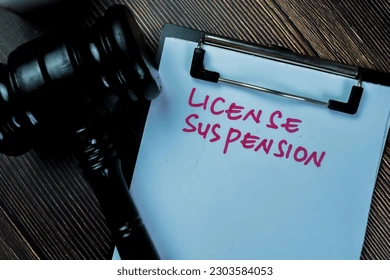
Owning a driver’s license and driving a car is a great privilege but it also comes with responsibilities. For ensuring the safety of people Canada has strict laws that apply on the roads and govern traffic. In case you break these laws you may be in a situation where your license is suspended or cancelled.
Let’s understand the difference between these two terms and focus on the options we have if things like these happen.
Understanding the Difference: Suspension vs. Revocation
- Suspension: A suspension is not being able to use your license or having an inactive license for a short period. This mainly happens when you break a specific traffic law, for example speeding or getting a red light ticket. Also, losing too many points can lead to suspension. Let’s discuss an example where you are under suspension for 30 days and during these days it’s forbidden for you to drive. Once 30 days have passed you this means the suspension period is over and you will be permitted to drive after getting your license back by paying the reinstatement fee and finishing any classes that are needed, like a defensive driving course, to prove that you know how important it is to follow the law.
- Revocation: Revocation, which is a more serious penalty than suspension, results in the permanent loss of your driving rights. Usually, this kind of action is reserved for more serious offences, like recurrent DUIs or causing a collision that leaves a person seriously injured or killed. For example, if a driver commits several violations involving driving while drunk, their license may be suspended, and they will need to undergo a thorough assessment of their driving skills before being granted permission to obtain one again. Retaking the written and driving tests as well as occasionally finishing extra courses centred on safe driving techniques are all part of this process.
Common Causes for Suspension or Revocation
Now that we understand the difference between suspension and revocation let’s discover the main reasons that lead to those.
- Impaired Driving in Canada: Driving a vehicle when you are not fully cautious because you are under the influence of drugs or alcohol is a serious violation. If this fact is revealed you can be immediately suspended. Given its potential to cause harm, impaired driving is aggressively monitored and penalized.
- Dealing with Speeding Tickets: Accumulating speeding tickets can quickly lead to points on your driver’s license, and eventually, suspension if proactive measures aren’t taken. Each ticket can move you closer to the threshold where suspension is mandated.
- Traffic Violations and Criminal Charges: Some traffic violations can escalate to criminal charges, especially if they involve endangerment or harm to the public. These are treated with the utmost severity, often leading to the revocation of driving privileges.
- Accumulating Demerit Points: In Canada, a point system is used to track traffic violations. Exceeding a certain number of points within a specific timeframe can lead to a suspension.
- Failing to Appear in Court: If you are asked to be present at court because of a ticket but you neglect it and miss the date you may be suspended until you find a solution.
The Points System
Each province in Canada has a points system that tracks the accumulation of offences by drivers. Once you hit a certain point threshold, you may face a suspension. It’s important to understand how points are assigned and accumulated, as this can affect not only your current driving status but also future renewals and insurance premiums.
What to Do if Your License is Suspended or Revoked
- Contact a Highway Traffic Lawyer: A lawyer specializing in traffic law can advise you on your options and help you navigate the legal process (Highway Traffic Lawyer).
- Pay Any Required Fines: Outstanding fines may prevent you from reinstating your license.
- Complete Required Courses: Depending on the reason for the suspension or revocation, you may be required to take courses such as defensive driving or alcohol education.
- Retake the Driver’s License Test: In some cases, you may need to retake the written and road tests to regain your license (Driver’s license test preparation).
Driver’s License Test Preparation and Renewal
For new drivers or those looking to reinstate their licenses after suspension, preparing for the driver’s license test is crucial. Not only can a thorough understanding of the traffic laws help you pass the test, but it also makes you a safer and more responsible driver. Moreover, renewing your driver’s license on time is essential to maintaining your legal right to drive. Not renewing on time can cause needless problems and could impact your driving history.
Appealing a Traffic Court Decision
If you believe that your license was unjustly suspended or revoked, appealing a traffic court decision may be an option. This involves presenting your case to a higher court or a special tribunal, depending on the nature of the offence and the legal framework in your jurisdiction. Consulting with a highway traffic lawyer can provide you with legal advice and representation needed to navigate this complex process.
You need legal information to navigate the difficulties of a suspended or revoked licence. It’s important to plan proactive steps to make sure you keep your driving privileges. Make sure to deal with this issue as soon as possible and keep the process efficient regardless of the reason for suspension or revocation. By following the law, being aware of the penalties, and obtaining the right legal representation, you may be able to mitigate the impact on your license and way of life.
Subscribe to LawVo to get professional help through this process and to make navigating Canada’s complicated traffic law legal system easier. With LawVo, handling traffic-related legal issues effectively and confidently is now easier than ever thanks to access to professional legal advice and resources.
Back to blogs